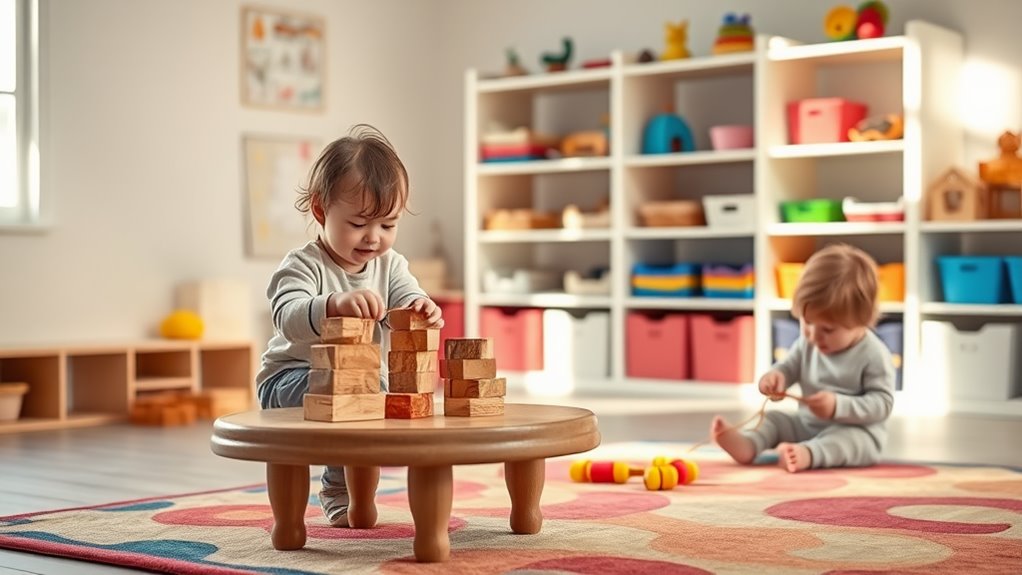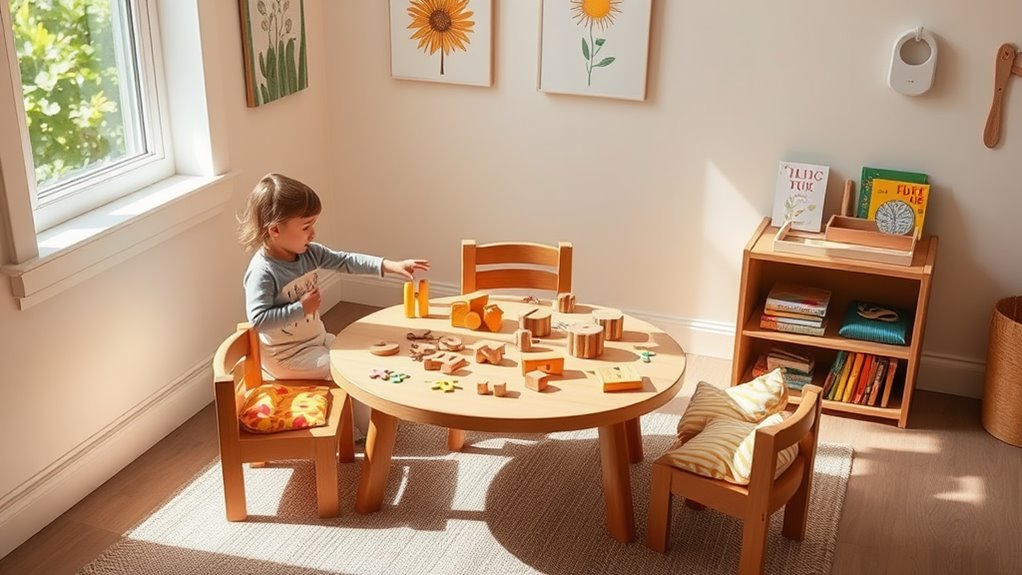The Role of Independence in Montessori Parenting
You might wonder how independence shapes the Montessori parenting approach and the long-term effects it can have on your child’s development. By allowing your child to make choices and explore their environment, you’re not just fostering autonomy; you’re also laying the groundwork for essential life skills. This balance between guidance and freedom can be tricky, but the benefits are often profound. So, what practical strategies can you implement to create an environment that nurtures this independence effectively?
Understanding Montessori Principles
Montessori principles focus on fostering a child’s natural desire to learn and explore. These principles encourage you to create a supportive environment where your child can thrive.
One key aspect is hands-on learning. By allowing kids to engage with materials directly, they develop a deeper understanding of concepts. It’s about letting them manipulate objects, solve problems, and discover solutions at their own pace.
Another important principle is mixed-age classrooms. This setting promotes collaboration and peer learning, enabling your child to learn from others while also teaching younger classmates. It builds a sense of community and responsibility, enhancing social skills.
Observation is also central to Montessori methods. You’re encouraged to watch your child as they play and interact, helping you understand their interests and needs. This insight allows you to guide their learning without taking control, fostering a sense of agency.
Lastly, the emphasis on intrinsic motivation means you should celebrate your child’s achievements, no matter how small. This recognition boosts their confidence and keeps them engaged in learning.
Importance of Independence
Independence is essential for a child’s development, fostering confidence and self-reliance. When children learn to do things on their own, they gain a sense of accomplishment. This feeling encourages them to take on new challenges, making them more willing to explore the world around them. You might notice that as your child starts to make their own choices, their self-esteem grows. They become more curious and engaged, often asking questions and seeking answers independently.
Moreover, independence helps children develop critical life skills. They learn problem-solving techniques, decision-making abilities, and responsibility. When they manage tasks without your constant help, they understand the consequences of their actions. This understanding lays a strong foundation for future learning and personal growth.
Importantly, encouraging independence doesn’t mean leaving your child to fend for themselves. Instead, it’s about guiding them as they practice skills and make choices. Supporting their journey fosters a trusting relationship, allowing them to turn to you when they truly need help.
Ultimately, embracing independence in your parenting approach nurtures resilient, capable children who are ready to face life’s adventures with confidence.
Practical Strategies for Fostering Independence
To encourage your child’s journey toward self-sufficiency, you can implement practical strategies that promote independence in everyday activities. Start by giving your child choices, even for simple things like snacks or clothing. When they feel they’ve a say, it boosts their confidence.
You can also create routines that allow them to take responsibility, such as making their bed each morning or helping to set the table.
Encourage your child to tackle age-appropriate tasks, like putting away their toys or dressing themselves. Offer guidance, but let them try on their own first. When they struggle, resist the urge to jump in immediately; instead, offer support by asking questions that help them think critically about the task.
Involve them in cooking or grocery shopping, allowing them to make decisions about meals or ingredients. This not only teaches practical skills but also fosters a sense of ownership.
Creating a Prepared Environment
Creating a prepared environment is essential for nurturing your child’s independence and learning. By setting up spaces that encourage exploration, you help your child feel confident and capable. Start by organizing areas where your child can easily access their toys, books, and learning materials. When everything’s within reach, they’ll be more inclined to choose activities that interest them.
Consider using child-sized furniture and tools, which empowers your little one to engage independently. For instance, a small table and chair can make art projects more inviting, while low shelves allow for easy selection of books or games. This not only fosters independence, but it also makes your child feel respected and valued.
You’ll also want to create a calm atmosphere. Declutter spaces and minimize distractions, helping your child focus on their activities.
Soft lighting and natural elements, like plants, can enhance the environment, making it more inviting.
Encouraging Decision-Making Skills
Empowering your child to make choices is an essential step in developing their decision-making skills. When you offer your child the opportunity to choose, whether it’s what to wear or what snack to have, you’re helping them understand the consequences of their decisions.
Start with simple choices; this builds their confidence and encourages them to think critically about their options. Encourage discussions about their choices by asking open-ended questions like, “What do you think will happen if you choose this?” This not only fosters independent thinking but also strengthens their ability to evaluate outcomes.
It’s important to provide guidance without taking over, allowing them to feel the weight of their decisions in a safe environment. As your child grows, gradually increase the complexity of the choices you present. This could involve letting them plan an activity for the day or pick out a book for bedtime.
Benefits for Children and Parents
While many parents may initially feel unsure about the Montessori approach, embracing independence in your child can lead to significant benefits for both of you. When you allow your child to make choices, they develop confidence and self-esteem. Watching them tackle challenges on their own can be incredibly rewarding, as you see their problem-solving skills grow.
For you, fostering independence means less micromanaging and more quality time spent together. You’ll find that your child is more willing to help around the house, whether it’s setting the table or tidying up their play area. This can lighten your load and create a sense of teamwork in your family.
Moreover, children who experience independence learn to take responsibility for their actions. They become more resilient, adapting better to life’s ups and downs. As they learn to manage tasks, you’ll notice a shift in their behavior, leading to fewer power struggles.
In essence, promoting independence not only nurtures your child’s growth but also enhances your relationship. You’ll both enjoy a calmer, more cooperative home environment, making parenting feel less overwhelming and more fulfilling.
Overcoming Challenges in Independence
How can you navigate the challenges that come with encouraging your child’s independence?
First, recognize that independence doesn’t happen overnight. Your child might resist new tasks or feel frustrated when things don’t go as planned. It’s important to be patient and supportive. Instead of stepping in immediately, give them a chance to figure things out for themselves. This builds their confidence and problem-solving skills.
Set realistic expectations based on their age and ability. If your child struggles with a task, break it down into smaller, manageable steps. Celebrate their successes, no matter how small, to keep them motivated.
You can also create a supportive environment by providing the right tools and resources, like child-sized furniture or accessible storage for their belongings.
Another challenge might be your own tendency to micromanage. Remember, it’s okay to let them make mistakes; that’s part of the learning process. By stepping back, you allow them to thrive.
Ultimately, communicate openly with your child about the importance of independence. Discuss their goals and dreams, and encourage them to take ownership of their choices. This dialogue fosters a sense of responsibility and empowers them to embrace their independence.




